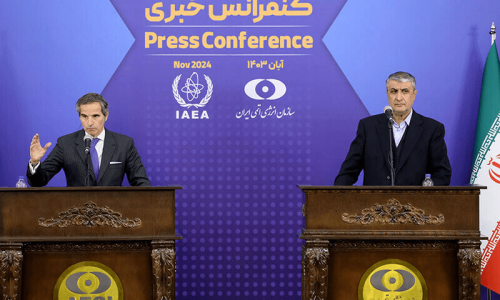KARACHI, Jan 31: A programme to introduce a new combination of vaccines to contain pneumonia, meningitis and several other preventable diseases in children is in full swing in Punjab and Sindh, and it is expected that the vaccine will be introduced in the entire country by March this year.
The $173 million programme is supported by the Global Alliance for Vaccination and Immunisation (Gavi). The government of Pakistan, however, will contribute $15 million. Unicef is also collaborating in the three-year project.
This was stated by Dr Altaf Bosan, National Programme Manager, Expanded Programme on Immunisation-Pakistan at a meeting of health experts held at the Aga Khan University (AKU) on Saturday.
Giving a presentation on the subject, Dr Bosan said that the pentavalent vaccine aimed at providing protection against diphtheria, tetanus, pertussis, Hepatitis B and Haemophilus Influenza Type-B (Hib). He said it would help contain the many diseases taking the lives of thousands of children every year.
“So far, we have no problem with the [pentavalent] vaccine that has 95pc efficacy. At the same time, training for capacity building of health workers is in progress,” he said.
About the status of the Hib disease in the country, he said that an estimated 23,000 children died of the illness. There is no recent data available on the prevalence of Hib pneumonia in Pakistan. Hib meningitis has a 10 per cent case fatality rate, and up to a 30 per cent permanent disability rate.
Speaking on the burden of the invasive Hib and pneumococcal diseases in Pakistan, Dr Zulfiqar A. Bhutta, Head of Maternal and Child Health Division, Aga Khan University, said pneumonia alone was responsible for 1.8 million deaths worldwide every year – 800,000 of which were children under the age of five – making pneumonia the single largest killer of children amongst diseases. The number of children killed by pneumonia is higher than those killed by HIV, malaria and measles combined.
In Pakistan, he said, a national survey indicated that pneumonia and meningitis claimed 77,850 children’s lives every year.
“Invasive Hib and pneumococcal disease are preventable. The world is willing to help Pakistan if we are willing to help ourselves, as there is now support available for vaccination programmes. Hib vaccine results abroad have been good and there is a dramatic reduction in the number cases.”
Most pneumonia deaths, he said, occurred early in the course of illness. Early recognition and treatment was critical. He stressed the need for involving community health workers with proper training in the vaccination programme for these diseases and said that community-based management strategies had been very successful in such programmes.
Identifying risk factors in pneumonia, he said that indoor air pollution (burning of fossil fuels) increased the risk to 78 per cent.
Highlighting the role of advocacy in combating childhood pneumonia and meningitis, Ciro de Quadros, executive vice president, Sabin Vaccine Institute, said that pneumococcal disease, an infection caused by a type of bacteria that can lead to pneumonia, meningitis, ear and sinus infections, was a leading killer (amongst infectious diseases) of children and adults worldwide.
“South Asia and sub-Saharan Africa have the highest incidence of pneumonia. Pakistan is on the fourth number after India, China and Nigeria. Around 7 million people are affected by pneumonia in Pakistan every year,” he said.
Despite being a preventable disease affecting millions of people, this public health issue has not been given much attention. Pointing out the reason, he said: “About 24 of the 26 countries routinely protecting their children with pneumococcal vaccines are high-income countries that represent less than one per cent of the worldwide burden of this devastating disease. By contrast, none of the world’s low-income countries are yet routinely vaccinating against pneumococcal disease.”
There is now, however, support available from organisations like Gavi, which help low-income countries introduce pneumo vaccines. It is time for governments internationally to take advantage of this progress and ensure it is available to the people who need it most, he added.
Citing examples of different countries, he also made a strong case for investing in immunisation programmes in order to improve the health, and wealth, of nations.
The event brought together a number of important stakeholders in child health in Pakistan, including health professionals, representatives from the Ministry of Health and EPI officials. Dr Rashid Jooma, Director-General Health, Dr Sagheer Ahmed, Minister for Health, Sindh, and Dr M.A. Arif, General Secretary, Pakistan Paediatric Association, also spoke on the occasion.













































Dear visitor, the comments section is undergoing an overhaul and will return soon.